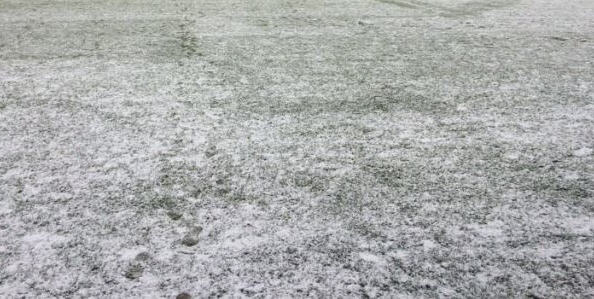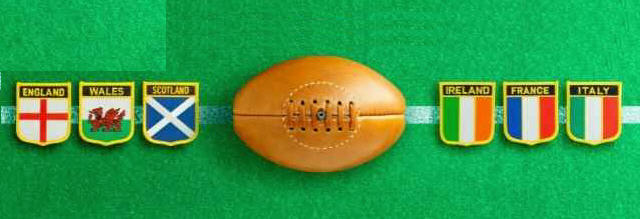Many professional clubs have undersoil heating but even big clubs and international teams have games called off due to frozen pitches.
Although the decision making to call off a match is a little different between amateur and professional levels, the motivations are the same: the safety of all the players.
Why Don’t Rugby Teams Play On Frozen Pitches?
Rugby teams don’t play on frozen pitches due to three main reasons:
- Slippiness of frozen surfaces causing reduced grip for players when running
- Protruding pieces of hard frozen mud causing trips and bangs
- Front row players unable to get purchase with their studs when scrummaging
Slipping
Players jink, swerve, and sidestep throughout a rugby match to avoid being tackled. Those kinds of movements are very difficult on a slippery surface when studs aren’t sticking.
Slips on the run can lead to torn ligaments.
Protrusions
Any rugby pitch has ruts and divots on its best days unless it’s been freshly laid. In frozen conditions, the edges become very hard and sharp. They may as well be raised spikes.
Players can injure ankles by tripping over frozen protrusions. They also can cause harm if players land on them!
Scrummaging
The problem with frozen grass is that it doesn’t offer any purchase to studs. This is particularly dangerous for the front row when trying to scrummage.
A heavy slip in the scrum can lead to it collapsing with force. The sport is very keen to minimize neck injuries during scrums.

Who Decides That A Rugby Pitch Is too Frozen To Play On?
Match referees can abandon a rugby match at any time if they decide the pitch is frozen.
At amateur level, team captains can decide that the conditions are unsafe for their players. At professional and international level, the decision is usually made by the referee and not the players.
Professional matches can have large crowd attendances and may also be televised. Calling them off isn’t just inconvenient for players and supporters. It can also be a big financial hit.
Match referees have the ultimate say-so, but they’ll usually confer with the tournament officials at the ground.
Decisions at amateur level
I’m most familiar with British and Irish amateur competitions, so I can’t speak for all regions. But in my experience, amateur referees prefer that the team captains make the decision before the match starts.
Either captain is entitled to express concerns to the referee. If there is a disagreement between the captains (one wants to play and the other doesn’t), the referee will mediate and try to get a joint decision.
But there doesn’t need to be agreement. If one captain says the pitch is frozen, then the referee will call off the match.
Are you wondering why the reticence amongst referees at amateur level? The next section will explain why.
Frozen Pitches And Court Cases

This court case doesn’t actually involve a competitive match. A city council in Scotland organized a training course for rugby coaches back in 2014.
The course included training exercises on a rugby pitch. One attendee sidestepped to avoid a tackle and fractured his ankle.
He took a court case against the council for damages due to his injuries.
Both sides agreed in court that the conditions that day were frosty. The question was whether the training officials had assessed the risks correctly in allowing the exercises to go ahead.
What was the verdict?

The judge ruled in the plaintiff’s favor and left the council liable for the damages.
The financial hit wasn’t against a club, but you can be sure that amateur clubs and associations in the country and beyond took notice of the decision.
Referees have their own association, and they certainly don’t want to be held liable for player injuries on a frozen pitch.
This is one factor when it comes to amateur referees preferring that the club captains make the decision on whether to play or not.
How Do You Test For A Frozen Rugby Pitch?
The earliest years of the sport took place in England and Scotland in the nineteenth century. So, teams faced frozen pitches from the start.
Rugby teams test for a frozen rugby pitch by walking across the grass before a match while wearing their studs.
The test is to check that studs sink into the field in all areas.
If they skate across the surface instead, then the pitch is too frozen for safe play.
It’s important to check the perimeters as well as the main playing area. Wingers are particularly at risk from being tackled onto frozen ground.
Even Professional Matches Are Called Off For Frozen Pitches
Rugby is a winter sport in Europe and North America, so frozen pitches do present as a problem.
Nowadays, professional clubs usually have undersoil heating beneath their playing fields. This has reduced the occurrence but hasn’t eliminated it.
In 2021, two professional club matches were suspended due to frozen pitches – one in Wales and one in Scotland.
Early call
Welsh club Dragons were due to play Edinburgh in the PRO 14 league in February 2021.
When the pitch at Rodney Parade was inspected on the morning of the match, large patches of the pitch were found to be frozen.
The officials made an early decision as the weather reports predicted the temperature would not rise above freezing before kick-off.
Why don’t tournament officials always take early decisions? Late decisions are highly inconvenient for traveling supporters!
The hope is that undersoil heating and/or rising daylight temperatures will thaw out the pitch and allow the match to go ahead.
Late call
In contrast to the match in Wales, there was a late call-off to a local Scottish derby between Glasgow and Edinburgh the previous month.
The officials took the decision to the wire. They only called off the match when the teams were warming up and practicing their scrummaging.
This is what Edinburgh coach Richard Cockerill said:
The plastic grass on the top was soft but underneath it was very hard and wouldn’t take a stud.
Once we got to scrummaging over on the far side, all the front row players couldn’t get any grip at all.
They just slid straight to their faces.
Richard Cockerill, Edinburgh Coach
International Rugby Matches Called Off Due To Frozen Pitches
Late call-offs are even more inconvenient for traveling supporters to international matches.
However, pitches for international games will have the greatest degree of staff and equipment to fight the freezing temperatures.
But sometimes Mother Nature cannot be beaten.
2012 Six Nations

In 2012, the Six Nations was played during a particularly cold snap of European weather.
France had played Italy at the Stade de France, and winger Vincent Clerc wasn’t happy that the game had gone ahead.
He expressed his frustrations to the media that the touchlines had been dangerously hard.
The local officials should have listened to their lethal but diminutive winger. The Italy match had taken place in the early afternoon.
The following week’s match against Ireland was a late evening kick-off. This was due to take place well after the sun had dropped.
Late call-off
Snow fell through the week but the stadium staff kept the pitch covered for protection. Two hours before kick-off, the pitch passed inspection.
But the temperature kept falling by the minute.
Shortly before kick-off, the crowds were streaming into the stadium and the players were warming up on the pitch.
I was watching the live television coverage that evening.
The commentators muttered that things weren’t looking good as the cameras focused on the referee and match officials who were deep in discussion at the side of the pitch.
The referee had found parts of the perimeter to be completely frozen, so he called off the match.
How Do Other Sports Deal With Frozen Pitches?

In January 2016, the English coastal town Bognor Regis had a club soccer match scheduled against rivals Altrincham Town. Never heard of these places? Don’t worry, that’s not the point.
These soccer clubs were playing in an amateur league, and their facilities would not be top-notch.
With freezing temperatures on the day of the match, the Bognor Regis officials went the extra mile to ensure the game went ahead.
They drove six cars into the grounds and onto the iciest part of the pitch. By keeping the cars running, they successfully thawed out the frozen areas.
The pitch passed a later inspection, and the match was on!
To be honest, Bognor Regis was a trailblazer but the practice hasn’t caught on elsewhere…
Could you imagine a few Bentleys driven onto the hallowed turf of Twickenham? That would be a sight!